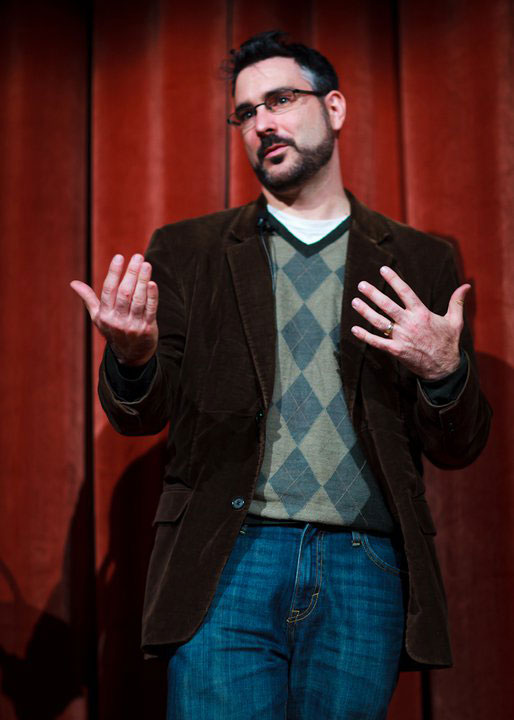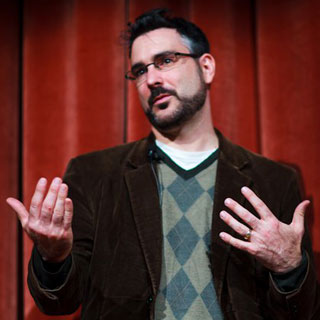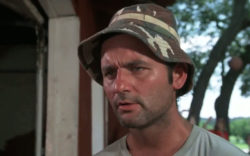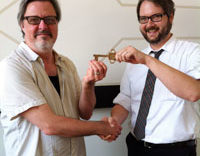
Gabe Wardell at the DecaturDocs film series in 2011.
On Jan. 1, Ciné, Athens’ downtown arthouse cinema for the past five years, made the transition from privately owned business to 501(c)3 nonprofit entity. Under the stewardship of Brigitta Hangartner, the theater’s founder and erstwhile director, Ciné became the treasured hub of Athens film culture; now, as the nonprofit Athens Film Arts Institute assumes responsibility for its operations, the arthouse faces a new set of challenges and opportunities.
Early this year, AFAI hired Gabe Wardell as Ciné’s executive director; he officially begins his new job Feb. 1. The director of the Atlanta Film Festival from 2006–2010 and an organizer of several other festivals over the past 20 years, Wardell has spent his adult life working in the field of independent film, from the projection booth to the fundraising circuit and numerous points in between. Flagpole spoke to Wardell last week, as he prepared to take up his duties in Athens.
Flagpole: Why don’t you tell me a little bit about your background? You were the director of the Atlanta Film Festival for what, about five years?
Gabe Wardell: About four-and-a-half years… I have a fairly extensive background in film festival presentation, in particular. I’ve been involved in film festivals for about 20 years now… since I was an undergraduate in college. I started doing some work with—way back when, it was called the Baltimore Film Forum; that’s where I’m originally from, is Baltimore—and they were presenters of the Baltimore Film Festival. They were a year-round, nonprofit arts presentation organization… I was essentially a full-time intern on a fellowship from my undergraduate school… That was at the height of the last great Republican revolution, quite honestly… that was when they had the Contract With America, and they targeted funding from the [National Endowment for the Arts]. And so, when a lot of their funding fell away, the Film Forum was one of the casualties of that… When they went out of business, I learned at that point that things aren’t always going to be rosy in this business. It takes a combination of business acumen, plus the passion and perseverance and love of what it is you’re doing to make it happen.
I put together a number of interesting career paths then, including… as a 35mm projectionist, and 16mm, and I did some digital… I worked full-time at a video store; I had done some film writing for the free weeklies… I spent a little time in graduate school for film studies; I worked briefly for a film distributor in New York City that’s still in existence, Kino (it’s now Kino-Lorber)… And from there, it was really a leap into the festival world: I started an affiliation with Slamdance, which is happening right now in Park City… And from there, I formed a really interesting network of festival connections that took me a lot of different places…
And I landed, after a number of years, doing a lot of different things at the AFI Silver Theatre right outside Washington, D.C. in Silver Spring, Maryland. That was really a great plateau period, where I had the opportunity to work with Silverdocs, which was an annual documentary film festival that they staged in partnership with Discovery Channel, and also transitioned from producing that festival to working year-round on the programming for the three-screen arthouse model that they had set up at the time. So, we were doing a pretty aggressive combination of classic repertory, and we transitioned into doing a lot more first-run arthouse-type engagements. And so, I was one of the key players in the programming staff they had there… Since then, it’s been running on—I hate to say “auto-pilot”—but it’s really been running rather smoothly…
[A long conversation ensues, focusing on the impacts of increased home viewing options and quality on repertory programming in arthouse cinemas.]
GW: It makes it so hard to give an audience something new, unique and special that they’re going to want to leave the house to go do. So, it’s really the arthouses’ job now to try to find new and interesting ways to show films. And often, it’s about providing an experience, or a context for the show that’s going to warrant people having to come out and see it. A good example that’s happening as we speak is this Film Noir Series that’s going on at Ciné. It’s a good example of an audience that seems to appreciate that, but when you show a series like that, by and large, it’s not the obscure titles anymore. At one point, you would’ve seen a lot more “deep cuts.” Now, you essentially have to show The Big Sleep, Kiss Me Deadly and so forth—these are the titles that are recognized, that can hopefully draw the audience. And then, if you want to occasionally drop in something more subtle down the line, once you’ve built up that trust, you can…
FP: There’s a very real sense in which—you can call it building up the trust of the audience, or you can call it “training” them as far as what to expect—but that has to happen before you can expect people to come and see things that they’re not familiar with, which goes for repertory as well as new stuff… What are your thoughts for Ciné, as far as that goes? Do you have some specific ideas about how you intend to approach programming? About the kind of identity that you think Ciné can or should have as it transitions from its initial phase to this new one as a nonprofit?
GW: Yes. Absolutely. There are a few things that I think are critical. I often use sports analogies, which some people love, and some people don’t care for so much… but I’m a baseball fan, and I love football as well… I’m a big fan of Moneyball [Michael Lewis’ 2003 book, now a film, about how Oakland A’s General Manager Billy Beane, relying on rigorous, in-depth statistical analysis rather than traditional baseball scouting methods, assembled an inexpensive team that was able to compete strongly with clubs that spent many times more money]… I like Michael Lewis’ writing in general, but I’m a fan of Billy Beane. I love the way he approached baseball analytically, and used statistical data to inform his opinions about which players to draft. And what he discovered at that time, that now everybody has figured out, is that there are players that have lower value on the market than they should, based on the certain calculus that he applied…
So, I look at film programming in somewhat the same way. When I was at AFI—and I’m not a huge math and numbers kind of guy—but I learned very quickly how to read the data for the film grosses, and how they’re performing; which ones have the best chance for longevity, as opposed to turning it over every week. And when you have multiple screens, you have a little bit of flexibility, and I think Ciné, with two screens and then this third space [the CinéLab], there are some interesting things that you might be able to experiment with. The critical thing is to respond to the needs of your audience. Some films will perform extremely well in some markets and underperform in other markets, and they won’t understand why…
If the audiences liked the films, they would have done well. I know that sounds really basic, but if you show a good film to a receptive audience, they’re gonna tell other people to go see it. They’re gonna want to share that experience with people. If you show a hard film that may be a great film, but it’s a complicated film, or it’s a film that leaves you questioning at the end, they’re gonna tell their friends, “I didn’t care for it that much—it was confusing.” You know, that happens a lot. So, you have to determine: is your audience the kind of audience that wants to be challenged? Are they going to want to embrace something that has multiple twists and plot turns, like Tinker, Tailor, or are they gonna want something a little more straightforward in its delivery, more classical, like My Week with Marilyn; more sentimental? Something like The Descendants—is that the kind of film that’s gonna hit that sweet spot, or are audiences ultimately saying, “Eh, it didn’t really add up to a whole lot for me.”—do they need more substance?
So, it really is a matter of viewing the data, and the data will answer for you. They will tell you. And usually, once you have that in place, you can start to find the comparable titles. And there’s obviously exceptions, and there’s obviously breakouts, but in general, once you have a sense that—if a certain form of film performs well for you, then it indicates the other kinds of films that will perform well…
Arthouses have a responsibility [to provide something different from the standard multiplex experience], and you start with the programming, but you hopefully deliver a very full-fledged experience that sets them apart from that. And, we know that the audience is a more mature audience, a more discerning audience, so you can’t just pull a fast one—they’re a smart audience that wants to be challenged. So, you have to meet them halfway, and hopefully, they will gravitate toward some of your riskier choices…
FP: What about repertory stuff? Do you see that as something that can or should be expanded in Ciné’s programming?
GW: Absolutely. I think there are two things that make repertory rewarding and challenging. Repertory, I think, should be a staple of what [arthouses] do. I think there’s a responsibility to keep it fresh, and [also] to keep showing the films that people have fallen in love with… They’re the essentials that built the house, and you have to keep acknowledging them and exposing new audiences to them and creating those experiences. I think the way to make it work—and we can obviously do some experimentation with it—I think that creating some sense of regularity to certain kinds of programming… You pick a few slots that you’re always going to run a standard series in. I think that’s one very effective way to do it.
There’s bringing in speakers… I like to look at it like a book club: I’d love to create that type of regularity. And I think we’ll figure out what we’re doing with the membership base, finding a way to reward membership… They might get exclusive opportunities to see certain kinds of films, or have repertory experiences. Or, showcase brand-new documentary content, like they did at the IFC Center in New York with the Stranger Than Fiction series… So, I think there’s ways to keep it fresh, to keep audiences interested, and to showcase the breadth of contemporary and classic film.
FP: I hope so. So, what’s the difference between a nonprofit arthouse and a privately owned one? This is the transition that Ciné’s making; do you see particular opportunities in that transition? What can a theater do as a nonprofit that Ciné hasn’t been able to do as privately owned?
GW: That’s a great question. I think the first thing that people need to understand about “What is a nonprofit?”—one of the cornerstones of being a 501(c)3—is that there technically is no owner, and the motive for what you do is not based on crass, commercial bottom line. That said, it doesn’t give you license to not respond to market forces. Nonprofits are not companies that are designed to run into the ground, or companies that sit there and beg people to give them money because they can’t survive otherwise. Nonprofits are companies that run for the public good, but they run in the service of a public mission… They are owned by the community as a whole, so they have to answer to that community and respond to that community… Which is, I think, what makes them special.
In the case of a transition from a for-profit, privately owned entity to a 501(c)3 nonprofit, the biggest opportunity right out of the gate is a membership program. Anybody can start a membership program, but when you’re a nonprofit, there’s a different level of engagement with the community. So, people are agreeing not only to patronize your company, but to essentially become public supporters of it… It means that if you are successful at fulfilling your mission and serving your community, you should be successful at encouraging people to become members. People should join out of a sense of public responsibility: you’re not just filling coffers; you’re giving money to the organization because you believe that they can help fulfill this mission…
The second part of that is, you are also eligible to apply for public support from people who give grants… there’s government entities… then, there are also foundations, private givers out there that are always looking to underwrite entities like nonprofit arts institutions, for the benefit of fulfilling and advancing their missions… There are a dozen [different] foundations out there that may be helpful in [enabling] Ciné to fulfill certain goals and certain missions in the course of the next year.
One of the bigger [goals] that is a topic of conversation is, how are you going to address the digital conversion? How should independent theaters upgrade their equipment so that it adheres to the new national digital standards that are already underway at the multiplexes—and at many of the distributors… They have already agreed; it’s a done deal. And, the arthouses weren’t necessarily part of that conversation—if you weren’t represented by a major chain or the National Association of Theatre Owners, you weren’t part of the conversation… Independent theater owners need to find out how to weather this transition, and being a nonprofit will allow Ciné, should they take that course of action, to address the conversion through, at least, a proper capital campaign. Whereas, if it’s a privately funded organization, that’s not possible…
Having just gone through this sort of crash course, and talked to a dozen experts, each one of whom has a different opinion about what the right course of action is, I can say it’s a hot topic of conversation. It’s something that will definitely be on the agenda to figure out, but for the time being, we’re just going to explore all the options that are out there, and take what’s best.
FP: So, you start February 1. Any final thoughts, by way of introducing yourself as you arrive?
GW: I can’t wait to get to know people, both individually, and to get to know the community collectively. I’m a big fan of Athens, as a town and as a community. As somebody who’s been living in Atlanta for the last couple of years, I look at Athens with a certain degree of envy… I feel like there’s more of a cohesion to the community of Athens—a strong investment across the board, both as a pride in that community and a sense of commitment to institutions and the arts, and sustaining this reputation over time. It’s something that people actually are adamant about—they defend it. And, that sense of pride is something that can’t be replicated; it can’t be faked.
Knowing that was a huge part of my motivation for even applying for the position. Because I didn’t want to enter the marketplace where I was gonna be swimming upstream, constantly fighting the tide, and trying to say, “No, seriously, people—film is art!”
Like what you just read? Support Flagpole by making a donation today. Every dollar you give helps fund our ongoing mission to provide Athens with quality, independent journalism.









